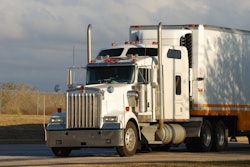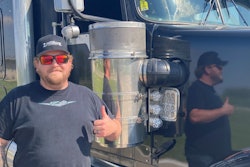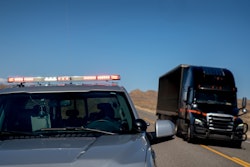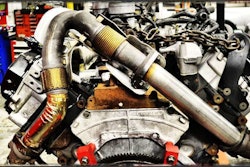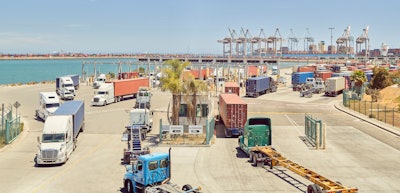
In its latest effort to crack down on diesel emissions in the state, the California Air Resources Board has taken its most drastic step yet, banning the sale of any new diesel medium- and heavy-duty truck beginning in 2036. That timeline will come even sooner for drayage operations.
CARB’s new Advanced Clean Fleets (ACF) rule was approved unanimously Friday, April 28. CARB estimates that, of the 1.8 million medium- and heavy-duty vehicles operating daily in California, 532,000 will be subject to ACF fleet requirements.
The regulation has heavy implications for motor carriers in the state, as it bars truck manufacturers from selling any combustion-engine trucks in the state by 2036. The 100% manufacturer sales requirement was moved up to 2036 from the original 2040 start date.
The in-use regulation applies to fleets performing drayage operations; those owned by state, local, and federal government agencies; and "high priority fleets," defined as entities that own, operate or direct at least one vehicle in California, and that have $50 million or more in gross annual revenues. The high-priority fleet designation also would include those that own, operate, or have common ownership or control of a total of 50 or more vehicles (excluding light-duty package delivery vehicles).

The regulation affects medium- and heavy-duty on-road vehicles with a gross vehicle weight rating greater than 8,500 pounds, off-road yard tractors and light-duty mail and package delivery vehicles.
[Related: California becomes first government in the world to mandate electric trucks]
Joe Rajkovacz, Director of Governmental Affairs & Communications with the Western States Trucking Association, virtually attended Friday’s CARB meeting and said WSTA had two individuals who testified during the meeting. Rajkovacz said for small-business owner-operators who do not enter California ports or railyards, the ACF “isn’t much of a threat until the later part of the next decade,” noting that “the CARB Board did tell staff to give them an update in 2027 in case they needed to ‘tweak’ the rule,” which he said could mean changing the timeline “if they are not seeing the results they want.”
He added that the ACF “doesn’t have some sort of ‘drop dead’ compliance date for carriers with under 50 trucks/$50M in annual sales that don’t operate out of ports,” noting that as of today, small business owner-operators could “conceivably purchase a new diesel-powered truck in 2035, and if the mileage stays low, operate it for the full 18 years permitted” under the state’s minimum useful life exemption that allows trucks to operate for 800,000 miles or until the engine is 18 years old.
Rajkovacz noted, however, that it’s expected that CARB will open up a new registry this summer for “smog checks” that will apply to any truck, regardless of state of domicile, in which truck owners will have to pay a fee to register in the database and, beginning next year, have their trucks’ emissions opacity checked (smog checked) twice a year by a certified tester.
The “high priority fleets” with more than 50 trucks or more than $50 million in annual revenue will have by the end of this year to choose their compliance path:
- Model Year Schedule: Fleets must purchase only "Zero Emissions" Vehicles (ZEVs) beginning in 2024 and, starting Jan. 1, 2025, must remove internal combustion engine vehicles at the end of their useful life as specified in the regulation.
- ZEV Milestones Option (Optional): Instead of the Model Year Schedule, fleets may elect to meet ZEV targets as a percentage of the total fleet starting with vehicle types that are most suitable for electrification.
[Related: California says it banned 230,000 trucks. What's next?]
Drayage operations
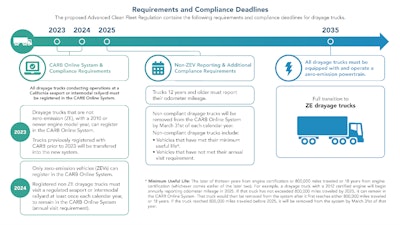 Beginning in 2024, only zero-emission trucks will be allowed to register to work at California ports, and any non-zero-emission drayage trucks will be required to visit a port at least once a year to keep its registration active.
Beginning in 2024, only zero-emission trucks will be allowed to register to work at California ports, and any non-zero-emission drayage trucks will be required to visit a port at least once a year to keep its registration active.
“Legacy trucks will need to register this year or forever be banned at the end of the year from accessing port facilities,” Rajkovacz said.
Non-ZEV drayage trucks in the CARB Online System, with a 2010 or newer model year engine and that visit a seaport or intermodal railyard at least once in a year, will remain in the system until they reach either 800,000 miles or the engine is older than 18 years, whichever comes first.
However, effective Jan. 1, 2024, only ZEV drayage trucks may register in the CARB Online System. Beginning in 2025, non-ZEV rigs will be removed from the CARB Online System if they did not meet the annual visit requirement or if they have exceeded their minimum useful life requirements. All drayage trucks entering seaports and intermodal railyards will be required to be ZEV by 2035.
Rajkovacz noted this is also important for fleets outside of California if there is any chance their operations take them to a California port “because beginning the first of next year, any truck ‘new’ to serving the ports will not be able to register and gain entrance” unless it’s a zero-emissions truck.
The CARB rule does include a provision that allows drayage fleets to purchase another used diesel-powered truck “with the same or newer model year engine as a truck that was rendered non-repairable due to a one-time event like a fire or accident without affecting the compliance date associated with the vehicle that was deemed to be non-repairable.”
Rajkovacz said CARB expects the CARB Online System to be up and running “sometime this summer.”
[Related: CARB opens small-fleet 'zero-emission' voucher program]
Minimal exceptions apply, trucking reactions, more
In cases where a ZEV truck is not available for purchase, fleets are exempt from the requirement. The ZEV Purchase Exemption allows an operator to purchase a new internal combustion engine vehicle and exclude it from the internal combustion engine vehicle removal requirement of the Model Year Schedule, or exclude it from the ZEV Milestones calculation. Exemptions to purchase internal combustion engine vehicles would only be needed if the fleet cannot otherwise meet the ZEV targets, CARB said.
A fleet owner can also apply for an exemption if a ZEV cannot be configured to meet the primary intended function the fleet owner needs. There are also exemption provisions for infrastructure challenges, and mileage/range shortfall considerations.
As expected, the ACF rule has received plenty criticism from across the trucking industry. Rajkovacz with WSTA said during Friday’s CARB meeting that “a few board members did question the availability of the necessary infrastructure to charge/fuel ZEVs, but in the end, it was just words, as they all voted unanimously to ‘jump off the cliff together.’ They really did ignore universal objections from the trucking industry. They really believe by forcing this dramatic of a change in the industry, somehow it will all come together -- it won’t.”
He added that he believes “the overwhelming majority of small-business truckers will never be able to afford complying with this rule despite all the rosy scenarios from supporters who don’t know a thing about trucking, but they think they are the experts.”
One of those so-called “rosy scenarios” Rajkovacz mentioned is CARB’s cost of ownership estimates. The board acknowledged that ZEVs cost much more up front, yet contended “reduced fuel costs, lower maintenance expenses, and Low Carbon Fuel Standard revenues are expected to deliver a net savings of $48 billion to fleets.”
Rajkovacz said CARB's claim about maintenance costs is particularly questionable. “There are still going to be routine maintenance costs -- tires, brakes, etc. -- any vehicle would have,” he said. “Attempting to claim any type of reduced drivetrain maintenance cost is totally bogus. Even electric motors burn out, batteries fail and lord forbid the truck is in a crash, just like what is going on now with electric cars -- minor crashes where the battery pack is damaged is causing the insurance companies to junk the car simply because there is no cost-effective way to repair the batteries.”
Owner-Operator Independent Drivers Association President Todd Spencer said the ACF rule “is another example of California approving onerous regulations that increase operating costs for truckers within the state. Whether it's CARB emissions requirements or misguided legislation like AB 5, it’s no surprise we’re seeing small-business truckers and independent contractors looking for opportunities elsewhere."
Spencer added that OOIDA has “yet to see proof that electric CMVs are a realistic option for most trucking businesses considering the price tag and lack of charging infrastructure. The bottom line is that the technology they’re trying to mandate does not yet exist."
[Related: Very narrow paths to electric-drive for small trucking]
The American Trucking Associations also issued a fiery response to CARB’s new rule. ATA President and CEO Chris Spear said CARB's adoption of its ACF regulation forces motor carriers to purchase ZEVs, ignoring the fact that these trucks are early-stage technologies and the infrastructure to support them does not exist.
"Fleets are just beginning to understand what it takes to successfully operate these trucks, but what they have learned so far is they are significantly more expensive, charging and refueling infrastructure is nonexistent, and ZEVs are not necessarily a one-for-one replacement -- meaning more trucks will be needed on California roads to move the same amount of freight," he said. Spear added that the state “is setting unrealistic targets and unachievable timelines that will undoubtedly lead to higher prices for the goods and services delivered to the state and fewer options for consumers.”
The Truckload Carriers Association agreed with other trucking groups, as TCA President Jim Ward called the rule “premature and irresponsible,” adding that adopting the rule “signals a lack of awareness regarding the present gap between goals and current achievability -- which if ignored will inevitably lead to supply chain disruptions that will affect the consumer and their pocketbook.”
[Related: Trucking groups slam 'challenging' new EPA rule that slashes truck emissions limits]
Funding opportunities available
CARB does highlight in its summary of the ACF rule that there are funding opportunities available for fleet owners looking to purchase zero-emission trucks, including programs aimed at small fleets. The Innovative Small e-Fleet Pilot Project is a $35 million set-aside within California’s Hybrid and Zero-Emission Truck and Bus Voucher Incentive Project (HVIP) to pilot an incentive program geared toward helping small trucking fleets and independent owner-operators access ZEVs. This pilot project opened for voucher requests from eligible small fleets in August 2022.
CARB also said it is redesigning its Truck Loan Assistance Program, open to small business truck owners with 100 or fewer employees, $10 million or less in annual revenue averaged over three years, and fleets with 10 or fewer heavy-duty vehicles subject to the In-Use Truck and Bus Regulation. That program will become the "Zero-Emission Truck Loan Pilot" to better support the financing of ZEVs along with any needed charging or fueling infrastructure, providing a streamlined lending process for small businesses that are transitioning to ZEVs. --Jason Cannon contributed to this report

